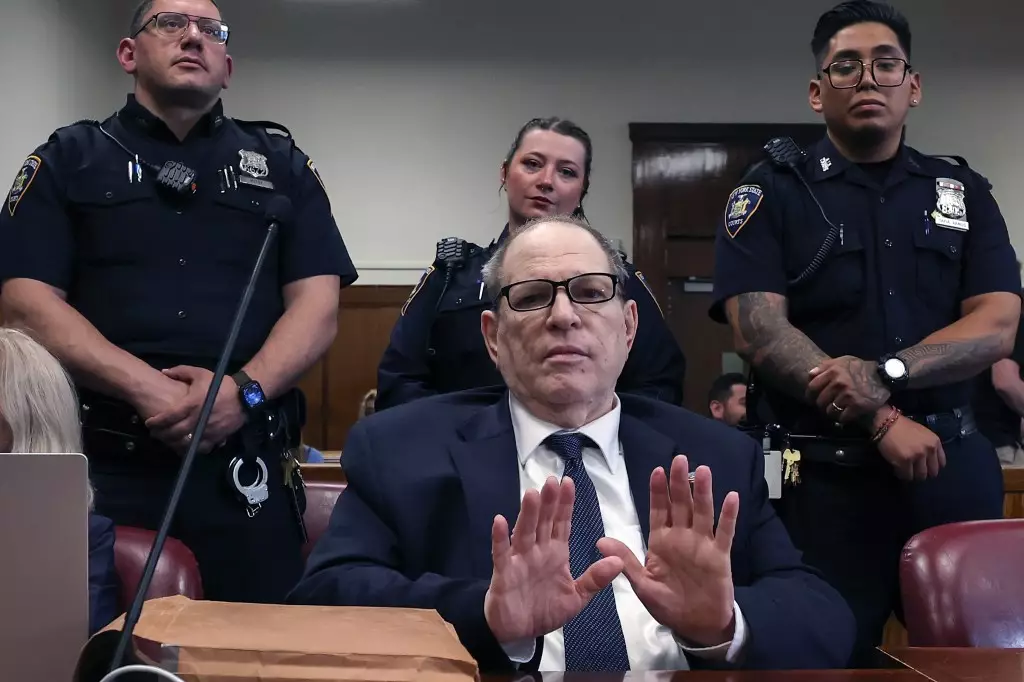The legal battles surrounding Harvey Weinstein have transcended mere court proceedings, morphing into a broad societal spectacle that scrutinizes not just the actions of one man, but the systemic issues of power, privilege, and accountability that envelop the entertainment industry. As Weinstein approaches yet another chapter in his convoluted legal saga, the decisions of his legal team speak volumes about the complexities intertwining morality, legality, and public perception.
Initially, Weinstein’s attorneys appeared deeply concerned about his health and potential outcomes of the trial. Reports surfaced that they doubted whether their client would even survive the rigors of his high-profile retrial in New York. Now, this fearful narrative has been replaced by a stark decision: Weinstein will not take the stand. This choice can be viewed as a strategic maneuver rather than a mere act of silence. Juda Engelmayer, Weinstein’s spokesperson, articulated their reasoning—concern that his testimony could open the floodgates to unhelpful inquiries about past actions and allegations.
The Calculated Risks of Testifying
It’s worth noting that despite Weinstein’s earlier enthusiastic desire to testify, which often evidenced a behind-the-scenes willingness to defend his honor, the choice to remain reticent indicates a pivot in strategy that emphasizes preservation over exposure. The legal team’s logic implies that the risk of scrutiny could overshadow the original charges, ultimately hurting the defense more than it could help. This is especially poignant given the history of misogyny and abuse in Hollywood that Weinstein embodies—a narrative that continues to weigh heavily on the scales of justice.
In the charged atmosphere that has enveloped the trial since the beginning, there’s a palpable tension between the desire for justice and the realities of a legal system that often favors the powerful. Weinstein’s previous trials offered him opportunities he never capitalized on. The presence of a new judge and the addition of a count of Criminal Sexual Act in the First Degree further complicate an already fraught scenario, underlining the ever-shifting nature of legal battles in high-profile cases.
Public Relations in the Wake of Allegations
Even without direct remarks from the stand, Weinstein has sought to shape public perception through his media engagements, showcasing a guerilla PR strategy that attempts to recast his narrative. A notable example was his interaction with right-wing commentator Candace Owens, wherein he vehemently proclaimed his innocence, claiming he is wrongfully accused. This endeavor to reclaim his narrative reflects a deep understanding of the media’s power to influence public perception, even in the court of law where the stakes are existentially high.
Weinstein’s rhetoric taps into the rocky emotional landscape that exists in today’s cultural climate. The introduction of the #MeToo movement catalyzed significant conversations about consent, power dynamics, and the frequently overlooked experiences of survivors—elements that Weinstein’s defense team contends have obscured the facts of his interactions with accusers. This assertion, presented as “friends with benefits” arrangements, seeks to polarize public perception away from the seriousness of the allegations. Such strategies do not merely aim to defend a client but reveal an industry battling its moral reckoning.
The Broader Implications of Weinstein’s Case
Weinstein’s retrial isn’t simply a legal anomaly; it reverberates within a society still grappling with the implications of rampant abuse and consent. The narrative surrounding Weinstein encapsulates a critical examination of cultural constructs that permit the exploitation of power. As watchers await the jury’s deliberations, they hold their breath not just for the verdict, but for the implications it will carry for the future of accountability in the entertainment world.
The confluence of legal intricacies, public opinion, and individual agency highlights a complex cycle that ultimately questions the sincerity of our justice systems and societal values. In a world where so many have come forward to expose their truths, the silence of one man speaks volumes, calling into question how justice is defined and served in the murkiest waters of human conduct and societal norms. The future of Harvey Weinstein—and by extension, much of the entertainment industry—hangs precariously at the edge of this reckoning.

